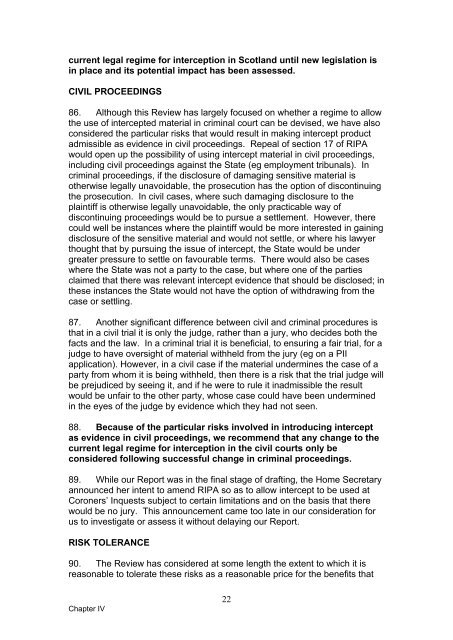Privy Council Review of intercept as evidence: report - Official ...
Privy Council Review of intercept as evidence: report - Official ...
Privy Council Review of intercept as evidence: report - Official ...
Create successful ePaper yourself
Turn your PDF publications into a flip-book with our unique Google optimized e-Paper software.
current legal regime for <strong>intercept</strong>ion in Scotland until new legislation is<br />
in place and its potential impact h<strong>as</strong> been <strong>as</strong>sessed.<br />
CIVIL PROCEEDINGS<br />
86. Although this <strong>Review</strong> h<strong>as</strong> largely focused on whether a regime to allow<br />
the use <strong>of</strong> <strong>intercept</strong>ed material in criminal court can be devised, we have also<br />
considered the particular risks that would result in making <strong>intercept</strong> product<br />
admissible <strong>as</strong> <strong>evidence</strong> in civil proceedings. Repeal <strong>of</strong> section 17 <strong>of</strong> RIPA<br />
would open up the possibility <strong>of</strong> using <strong>intercept</strong> material in civil proceedings,<br />
including civil proceedings against the State (eg employment tribunals). In<br />
criminal proceedings, if the disclosure <strong>of</strong> damaging sensitive material is<br />
otherwise legally unavoidable, the prosecution h<strong>as</strong> the option <strong>of</strong> discontinuing<br />
the prosecution. In civil c<strong>as</strong>es, where such damaging disclosure to the<br />
plaintiff is otherwise legally unavoidable, the only practicable way <strong>of</strong><br />
discontinuing proceedings would be to pursue a settlement. However, there<br />
could well be instances where the plaintiff would be more interested in gaining<br />
disclosure <strong>of</strong> the sensitive material and would not settle, or where his lawyer<br />
thought that by pursuing the issue <strong>of</strong> <strong>intercept</strong>, the State would be under<br />
greater pressure to settle on favourable terms. There would also be c<strong>as</strong>es<br />
where the State w<strong>as</strong> not a party to the c<strong>as</strong>e, but where one <strong>of</strong> the parties<br />
claimed that there w<strong>as</strong> relevant <strong>intercept</strong> <strong>evidence</strong> that should be disclosed; in<br />
these instances the State would not have the option <strong>of</strong> withdrawing from the<br />
c<strong>as</strong>e or settling.<br />
87. Another significant difference between civil and criminal procedures is<br />
that in a civil trial it is only the judge, rather than a jury, who decides both the<br />
facts and the law. In a criminal trial it is beneficial, to ensuring a fair trial, for a<br />
judge to have oversight <strong>of</strong> material withheld from the jury (eg on a PII<br />
application). However, in a civil c<strong>as</strong>e if the material undermines the c<strong>as</strong>e <strong>of</strong> a<br />
party from whom it is being withheld, then there is a risk that the trial judge will<br />
be prejudiced by seeing it, and if he were to rule it inadmissible the result<br />
would be unfair to the other party, whose c<strong>as</strong>e could have been undermined<br />
in the eyes <strong>of</strong> the judge by <strong>evidence</strong> which they had not seen.<br />
88. Because <strong>of</strong> the particular risks involved in introducing <strong>intercept</strong><br />
<strong>as</strong> <strong>evidence</strong> in civil proceedings, we recommend that any change to the<br />
current legal regime for <strong>intercept</strong>ion in the civil courts only be<br />
considered following successful change in criminal proceedings.<br />
89. While our Report w<strong>as</strong> in the final stage <strong>of</strong> drafting, the Home Secretary<br />
announced her intent to amend RIPA so <strong>as</strong> to allow <strong>intercept</strong> to be used at<br />
Coroners’ Inquests subject to certain limitations and on the b<strong>as</strong>is that there<br />
would be no jury. This announcement came too late in our consideration for<br />
us to investigate or <strong>as</strong>sess it without delaying our Report.<br />
RISK TOLERANCE<br />
90. The <strong>Review</strong> h<strong>as</strong> considered at some length the extent to which it is<br />
re<strong>as</strong>onable to tolerate these risks <strong>as</strong> a re<strong>as</strong>onable price for the benefits that<br />
Chapter IV<br />
22
















